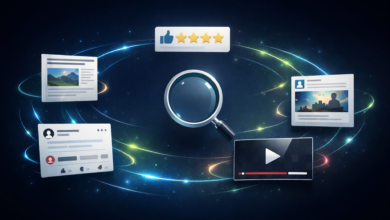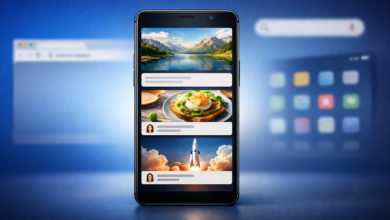AI’s Impact on SEO: Key Changes in Just 1 Year

▼ Summary
– AI has dramatically transformed digital marketing, forcing businesses to adapt SEO and content strategies while retaining core visibility principles.
– Google remains dominant for navigational, local, and real-time searches but faces competition from AI in complex query resolution.
– AI outperforms traditional search in research, planning, translation, and how-to queries by delivering instant, tailored responses.
– Visual search and content summarization benefit from AI efficiency but still require human creativity for emotional resonance and nuance.
– Successful marketers will combine AI tools with human expertise, focusing on brand authority, unique content, and authentic storytelling for long-term visibility.
The digital marketing landscape has transformed dramatically with AI’s rapid evolution, reshaping how businesses approach search visibility and content strategy. Just twelve months ago, predictions about Google’s decline seemed far-fetched, yet today many professionals increasingly rely on large language models for information retrieval. This seismic shift demands marketers rethink traditional SEO approaches while maintaining core principles that drive visibility.
Google remains dominant for specific search types despite growing AI adoption. Navigational queries, local searches, and real-time information lookups still overwhelmingly favor traditional search engines. The platform maintains its stronghold by delivering immediate answers through featured snippets and knowledge panels – a strategy that’s effectively kept users within its ecosystem. However, AI-powered tools now excel in areas where Google struggles, creating new opportunities and challenges for marketers.
Seven key search categories demonstrate AI’s growing superiority in information retrieval. Research queries that once required sifting through multiple sources now yield instant, accurate responses from chatbots. Planning complex activities like vacations or events becomes effortless with AI’s ability to synthesize recommendations and create detailed itineraries. Translation quality has reached new heights, often surpassing dedicated tools like Google Translate in natural language fluency.
How-to queries represent a particularly interesting battleground. While Google recently scaled back rich results for instructional content, AI platforms provide step-by-step guidance tailored to specific user contexts. This creates both threats and opportunities for content creators – those who adapt by offering uniquely human perspectives can thrive despite AI competition. The same dynamic applies to content editing, where AI assists with refinement but can’t replicate authentic voice and experience.
Visual search presents another frontier where AI excels. Generative image tools now produce remarkably realistic outputs, though many still lack the emotional resonance of human-created visuals. Savvy marketers recognize this gap, using AI for ideation while maintaining human creativity in final execution. Similarly, AI’s ability to distill lengthy documents into concise summaries creates efficiency but requires human oversight for nuanced interpretation.
For marketers navigating this transition, brand building becomes more critical than ever. Companies that establish themselves as category leaders benefit from direct navigational searches rather than competing for generic keywords. Ensuring AI systems properly recognize and cite your brand requires the same fundamental SEO best practices: crawlable, well-structured content that genuinely solves user problems. Technical optimizations remain important, but strategic differentiation through unique expertise and authentic storytelling creates sustainable advantages.
The most successful strategies will balance AI’s capabilities with irreplaceable human qualities. While algorithms can process information faster, they can’t replicate personal experiences or emotional connections. Marketers who leverage AI for efficiency while doubling down on originality, practicality, and authenticity will maintain visibility across both traditional and emerging search platforms. This hybrid approach represents the future of search marketing in an increasingly AI-driven world.
(Source: Search Engine Land)





